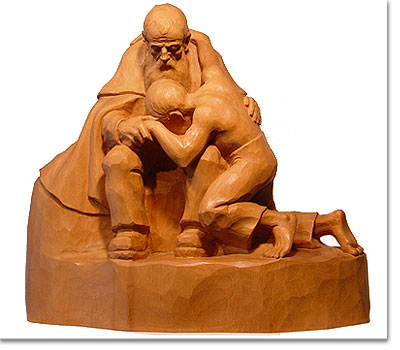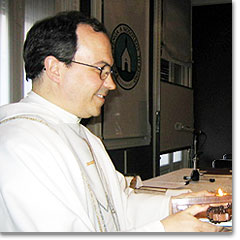
|
El Hijo Prodigo – El Padre Misericordioso Estatua hecha por Prof. Albin Moroder, Austria, publicación con permiso del artista; www.moroder.at Coming home: the Prodigal Son – The Merciful Father Statue made by Prof. Albin Moroder, Heimkehr: Der Verlorene Sohn – der Barmherzige Vater Figurengruppe „Heimkehr“ von Professor Albin Moroder, 6290 Mayrhofen, Österreich; Original -Entwurf in Zirbelholz geschnitzt und hell gebeizt, Höhe 37 cm . Veröffentlichung mit freundlicher Erlaubnis des Künstlers – Quelle: www.moroder.at/ Kontakt: info@moroder.at |
REFLECTION, Fr. Javier Arteaga. We are in the middle of Lent and on this 18th of March, a Covenant of Love day and a Sunday, the Gospel brought us the illustrative parable of the prodigal son (squanderer) or, seen from another perspective, the parable of the merciful Father (Luke 15, 1-3. 11-32).
 |
|
P. Javier Arteaga Fr. Javier Arteaga P. Javier Arteaga Foto: Crivelli © 2007 |
|
We have three actors: the younger son, who asked his father for his part of his inheritance and left home; he wasted his money, his freedom, grace…..and he ended up living and eating with the hogs…..that is, in total misery. One day when he was truly repentant, he decided to return and to ask his father for forgiveness: "Father, I have sinned against God and you," against God the Father and against you, my father, so he started back to his father. The second actor is the father who gave his son his share of the inheritance, his freedom, and sees him leave. He knew his son was living badly and his father-heart suffered. For years he waited for his son to return. We can imagine him looking toward the horizon, his eyes and heart open, wishing and without bitterness. On one of many days in which he expected the return of his lost son, he saw him coming from afar and Luke says that "he saw him and was deeply moved." He ran to him, embraced him and kissed him. José Luis Martín Descalzo, a Spanish priest and writer, says that surely when the son who was kneeling before his father tried to speak the words expressing his repentance and forgiveness, the father, covered the lips of his son with his hand and amid tears of joy, lifted him up and they united in a deep, strong, and warm embrace. The father asks that they put sandals and a ring on his son, symbols of the dignity and the goods he had recovered. A great feast was prepared for the son who had returned to life. And lastly, the third character in this story, the older son: he had always fulfilled all of his father’s wishes. He had always behaved well and had stayed with his father. He had also witnessed the departure of the younger brother, his wasted life and the pain he had caused his father. And now that "that son of yours" was returning repentant, you forgive him and you prepare a feast for him: it was too much, it was totally unjust.
The father seeks unity between his sons based on truth and love
We all have something in us of the prodigal son and of the older son. At some time we have "left" and we have squandered freedom and grace. Without wanting to, and at times wanting to, we have made mistakes; then we have truly repented and we have experienced God’s love….. a warm love which has sheltered us….. a strong love which has raised us up…..a faithful love which has remained in spite of us and has waited for us. But we also have something in us of the older son: we take pride in doing things well but we are intolerant to the faults of others; we value others according to our "absolute" criteria and we are nearsighted in recognizing the good which surpasses our plans; it is hard for us to believe in the sincere repentance of the one who has done something wrong and we say ‘look at him/her going to Mass and taking communion….." It is much harder for us to connect justice with mercy and reconciliation. At times we confuse mercy with weakness and permissiveness. We also confuse justice with revenge and the underhanded desire to get even. How can we then daily pray "forgive us our trespasses as we forgive those who trespass against us?" How do we understand the words of the Lord "I want mercy, not sacrifice; I have not come to call the just, but the sinners" (Mt 9, 13).
I imagine the good father in the Gospel looking at his children, the Argentinians, blind and hard of heart, we fight for "our" rights excluding others of their rights. It is the supremacy of personal interest, the law of the jungle, high and low social cannibalism, the voraciousness of opportunists who show off some type of power. On the contrary, the father seeks the unity of his sons based on truth which recognizes justice and love and which conquers all and heals. Unity and not exclusion. Cardinal Bergoglio reminds us clearly: "To reestablish social bonds we must appeal to the ethics of solidarity and generate a culture for encountering. In the face of a culture of fragmentation, as some have wished to name it, or of non-integration, it is demanded of us, even more so in difficult times….. to not favor those who pretend to capitalize on resentment, forgetting our shared history….. or they delight in weakening bonds, in manipulating memory and commercialize with utopias of equipment. For a culture of encounter, we need…..to construct an integrated universalism which respects differences; we also need a prolific dialog for a shared project." ("La nación por construir" [Constructing the Nation] p. 43)
"Love for one’s neighbor is a way for also encountering God"
As Schoenstatt Family we want to work for the culture of encounter and solidarity, for unity in truth and love, for a culture of the Covenant of Love. During Lent, Christ calls us to a personal encounter with Him who seeks the conversion of our harden heart and with Him to grow more in love. Benedict XVI tells us: "love of neighbor is a way to also encounter God and closing one’s eyes to one’s neighbor converts us into blind persons before God" (Deus Caritas est, # 16). During Lent we do more works and sacrifices out of love. Perhaps
- I could sacrifice my opinion which always excludes…..to include the opinion of …..;
- I could sacrifice my last solemn word to listen to what the other needs;
- I could sacrifice my daily complaint to offer praise for something good;
- I could sacrifice my stubbornness to begin to dialog with my family;
- I could sacrifice my comfort to look for the good of others…..
To build community, a Family Nation, is to lend a hand, "to place the country on one’s shoulders" (Card. Bergoglio), and also one’s neighbor concretely, with a large, strong, and faithful love.
Through the Covenant with Mary, may we grow into a generous and strong love in order to generate a spirit of Family and be able to maintain it; a faithful love to the pain of "good Friday" and full of victorious hope in "Resurrection (Easter) Sunday."
Translation: Carlos Cantú Family Federation La Feria, Texas USA 031607